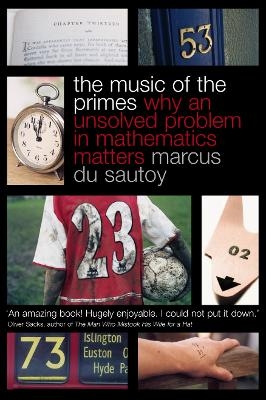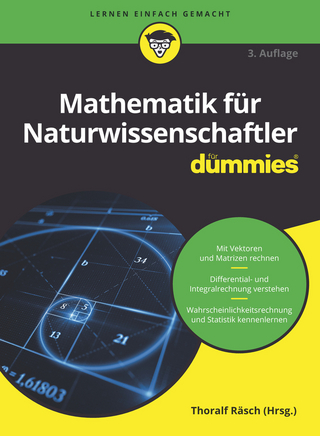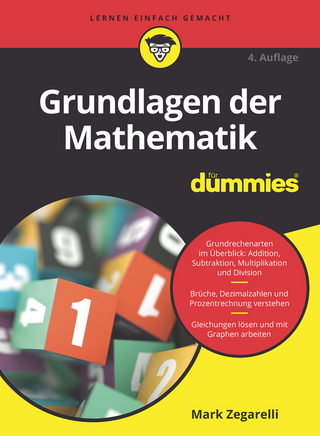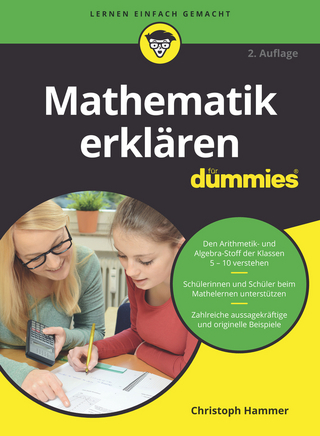
The Music of the Primes
Why an Unsolved Problem in Mathematics Matters
Seiten
2003
Fourth Estate Ltd (Verlag)
978-1-84115-579-1 (ISBN)
Fourth Estate Ltd (Verlag)
978-1-84115-579-1 (ISBN)
- Titel ist leider vergriffen;
keine Neuauflage - Artikel merken
In a stunning, historical narrative, ‘The Music of the Primes’ reveals the history behind one of the biggest ideas in science.
In 1859, the German mathematician Bernhard Riemann presented a paper to the Berlin Academy which would change the history of mathematics. The subject was the strange and enigmatic prime numbers. At the heart of the presentation was an idea, a hypothesis, that Riemann had not yet proved but which has come to obsess mathematicians for the last 150 years. No one knows if he ever found the proof; on his death his housekeeper burnt all the personal papers. Today, the hypothesis is considered by many the holy grail of mathematics but has significance far beyond maths.
At the of the heart of the enigma is a prize much larger than just intellectual glory; not only is there a $1 million reward for the person who can crack it but also is the key to all banking and e-commerce security. It is the idea that brings together many other areas of science and has ramifications within Quantum Mechanics, Chaos Theory and the future of computing.
In 'The Music of the Primes', one of Britain's leading mathematicians, Marcus du Sautoy, recounts the history of these elusive numbers. It is a story of eccentric and brilliant men, last minute escapes from death, strange journeys, dangerous ideas and the unquenchable thirst for knowledge that drove some men mad and others to unparalleled glory. du Sautoy also tells a coruscating history of Mathematics. Combining in-depth knowledge as a practitioner in the field with narrative flair, this book will become a classic of popular science writing and will rank alongside 'Chaos' and 'Fermat's Last Theorem' within the genre.
The Riemann Hypothesis:
• Compared to Fermat's Last Theorem, the Hypothesis is mathematicians’ real Holy Grail
• Is the only problem from Hilbert's 1900 Centenary Problems that was unproved in the 20th century and now has a $1 million reward for the person who cracks it.
• The Hypothesis is the key to all Internet and e-commerce security
In 1859, the German mathematician Bernhard Riemann presented a paper to the Berlin Academy which would change the history of mathematics. The subject was the strange and enigmatic prime numbers. At the heart of the presentation was an idea, a hypothesis, that Riemann had not yet proved but which has come to obsess mathematicians for the last 150 years. No one knows if he ever found the proof; on his death his housekeeper burnt all the personal papers. Today, the hypothesis is considered by many the holy grail of mathematics but has significance far beyond maths.
At the of the heart of the enigma is a prize much larger than just intellectual glory; not only is there a $1 million reward for the person who can crack it but also is the key to all banking and e-commerce security. It is the idea that brings together many other areas of science and has ramifications within Quantum Mechanics, Chaos Theory and the future of computing.
In 'The Music of the Primes', one of Britain's leading mathematicians, Marcus du Sautoy, recounts the history of these elusive numbers. It is a story of eccentric and brilliant men, last minute escapes from death, strange journeys, dangerous ideas and the unquenchable thirst for knowledge that drove some men mad and others to unparalleled glory. du Sautoy also tells a coruscating history of Mathematics. Combining in-depth knowledge as a practitioner in the field with narrative flair, this book will become a classic of popular science writing and will rank alongside 'Chaos' and 'Fermat's Last Theorem' within the genre.
The Riemann Hypothesis:
• Compared to Fermat's Last Theorem, the Hypothesis is mathematicians’ real Holy Grail
• Is the only problem from Hilbert's 1900 Centenary Problems that was unproved in the 20th century and now has a $1 million reward for the person who cracks it.
• The Hypothesis is the key to all Internet and e-commerce security
Marcus du Sautoy is a fellow of Wadham College, Oxford and has been named by The Independent on Sunday as one of Britain leading scientists. In 2001 he won the Berwick Prize of The London Mathmatical Society and in 2006 gace the Royal Institution Christmas Lectures. His book ‘The Music of the Prmes’ was published in 2003 to widespread acclaim.
| Erscheint lt. Verlag | 4.8.2003 |
|---|---|
| Verlagsort | London |
| Sprache | englisch |
| Maße | 159 x 240 mm |
| Gewicht | 655 g |
| Themenwelt | Sachbuch/Ratgeber ► Natur / Technik |
| Mathematik / Informatik ► Mathematik ► Allgemeines / Lexika | |
| Mathematik / Informatik ► Mathematik ► Analysis | |
| Mathematik / Informatik ► Mathematik ► Mathematische Spiele und Unterhaltung | |
| ISBN-10 | 1-84115-579-9 / 1841155799 |
| ISBN-13 | 978-1-84115-579-1 / 9781841155791 |
| Zustand | Neuware |
| Haben Sie eine Frage zum Produkt? |
Mehr entdecken
aus dem Bereich
aus dem Bereich


